Richard C McNeff
Author
About Lynne munn
Lynne Munn was born in Liverpool in 1924. She attended the Council Girls’ School from the age of 5 to 14. All but one of her teachers had lost their fiancés in the First World War. Her first job, aged 14, was as a cashier in a grocery store, followed by others in various factories. Aged 17, her home was destroyed in the Blitz on Liverpool. She lost everything, except the pyjamas she was wearing when dug out. Aged 19, she volunteered for the ATS (Women’s Army). She trained as a gunner and saw active service on anti-aircraft batteries in Kent and London.
In 1945, awaiting demob, she met an Eighth Army veteran called Richard McNeff. Marrying in 1946, they initially lived in Brighton where he took up amateur acting at the Little Theatre. They left Brighton after three years and went to London seeking adventure, using a veteran’s hostel as a base. Richard managed to get a job in a repertory theatre in Bognor. From then on they travelled the country various reps, including Margate, Ayr and Tunbridge Wells . Lynne taught herself book-keeping to help them get by.
TV swept away most of the reps, but as a character actor Richard managed to get parts on TV and in the British Film Industry and fell back on the accountancy training he had received when young to help out in slack times. He wrote a play called The Room They Left that the BBC produced.
In 1953 a son was born, also called Richard. In 1984, aged 60, Lynne retired from work. In 2006, she was widowed. She passed away in 2022.
Lynne wrote three novels and 200 poems. Several have appeared in anthologies and magazines, including the London Magazine. A selection appears below illustrated by Lynne’s oil paintings and pastels.
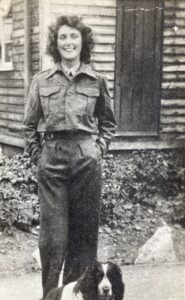
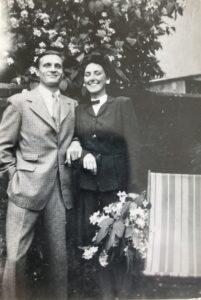
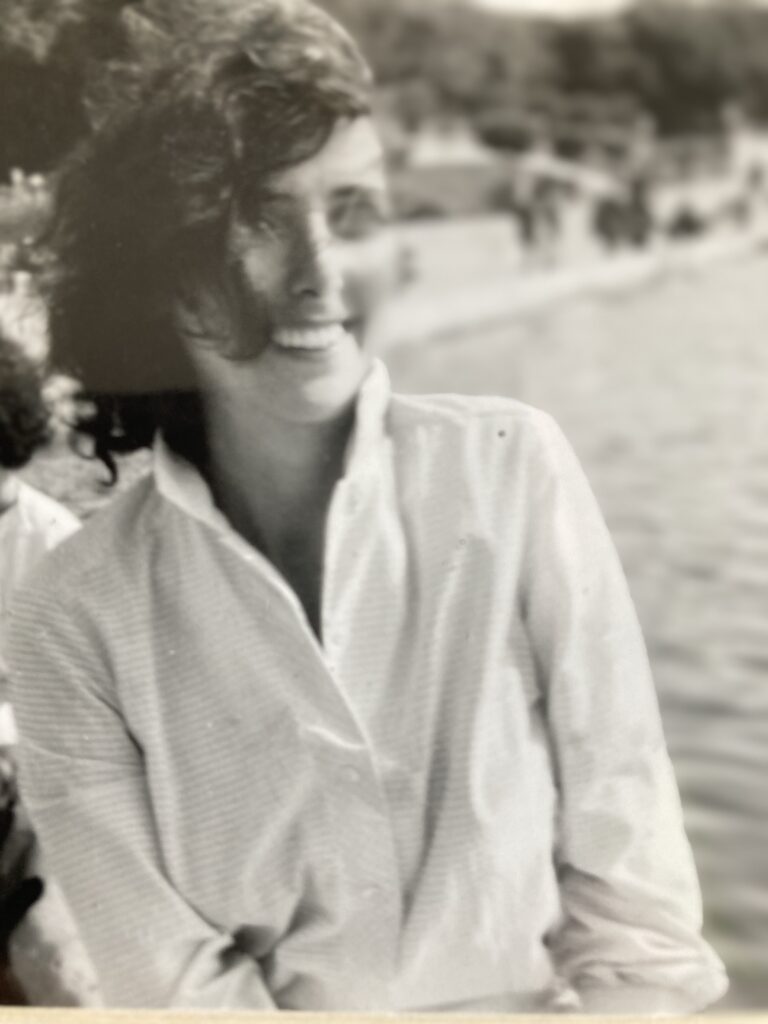
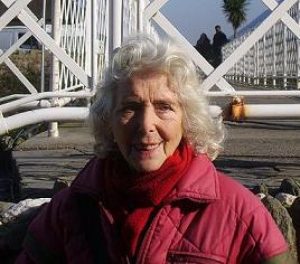
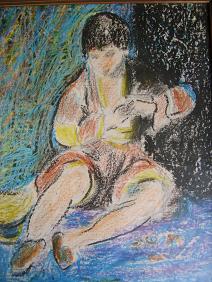
ERRANT DAUGHTER
Often I saw you lean
From your bedroom window
To touch with wandering hands
Laburnum blossoms, swaying
Like lanterns in the wind.
Now I hear it wail
Outside your empty room.
Where, where have you gone?
In which dark night
Did you shape this wound?
Whose hand will sever
The swelling bud.
Make void the oldest bond?
Oh! Who will hear you
When you cry aloud?
Now branches, leaf bereft,
Stretch to a desolate sky.
While winter covers with its shroud
Laburnum blossoms, rotting,
Rotting in the ground.
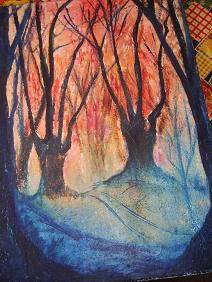
DEATH OF A HIND
Cold, pale February
The hunt is thundering by.
Sad, gray morning,
The hind will die.
Wild cry of terror
Borne on the wind.
Oh! see where the bracken
Is stained with blood.
All winter long
Safe and warm.
She carried the calf
That now is torn.
Torn…torn…
Out of the gaping wounds,
And with her entrails garlanded
Fed to the ravening hounds.
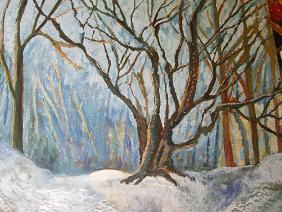
THE HOOD
Headlines poker-seared the news
Into my heart.
The Hood sunk – all hands lost,
Except for three,
None named Billy.
When the telegram came
Your mother went white
As a church candle, trembled,
Groaned, but did not cry,
Nor did I.
Down, down, I fled to our river
And stared long at the oily water
We used to cross on the ferry,
As children, then sweethearts,
Hand clutching hand, so tenderly.
Seabirds cried your name aloud,
Or so it sounded.
The wind brushed soft against my face
And moaned as if deep-wounded,
But how could that be?
Seaweed drifted northward, perhaps to the sea
That witnessed fate’s severance of you from me.
Ragged, grayish sheaves which so abound,
In time, may weave my drowned love’s shroud.
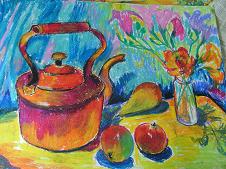
1919
The shell-shock man is off again
Running from lamp-post to lamp-post,
Running out his pain
From lamp-post to lamp-post.
Children gape as he flees past,
Veined, blue eyes aghast,
They are not aware
Of the terror there.
Nobody touches him
Or treads in his wild path,
Even the policeman turns away.
What could he do or say
To one whose mind was blown,
Lurching from trench to trench
On the Somme?

SLEEPLESS ON A SUMMER EVENING
The woman stares from her pillow
At the slipper moon in the sky,
Feels her husband turn heavily,
Hears her children move restlessly,
Listens to the wind’s insistent cry.
Rises from the bed
Goes down the stairs,
Unlocks the door and steps
Into the cool night air.
O night cool air
Brushing with velvet hands
Her fevered skin!
Feels beneath her feet
The tender grass,
Feels upon her cheek
The wind’s caress,
Lifts her arms to heaven
And begins to dance,
And dance, and dance,
With just the slipper moon
And stars, for audience.
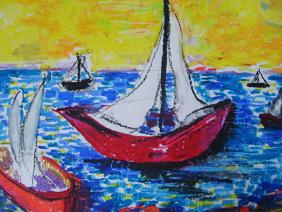
SWIFTS IN SPAIN
Are they aware these swifts
Who silently scythe the pine scented air
They are in paradise?
Unlike poor, fettered, encumbered man
Who the heavens can closely scan
Only when encased in metal vice.
Are they aware these tireless swifts
Playful as loving brothers in the air,
How wildly, blessedly free they are?
Never earthbound, never, never to bear
The shackles of tedium, loss, and pain,
Or the ache for that which always lies too far.
Are they aware of colour as they fly?
The luminous cerulean of sky,
Trees of olive green and vibrant viridian,
Quivering in the ardent caress of sultry sun.
Oh may you never be other than strangers to all that is mundane,
Rapturous in flight, unaware of summers that will not come again.
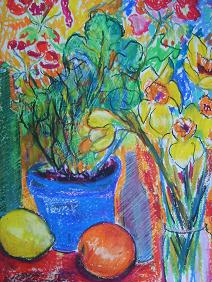
SUNFLOWERS
Outside all is gray, unutterably drear.
I turn away; eyes fall on a calendar
Open at the month of September,
Picturing a vase of sunflowers.
Dark-hearted, bold, brazen, beauteous
In bronze and brilliant yellow.
Painted by one
Born under pallid, northern skies,
Rarely visited by sun.
Who, fully alive did not become
Till faced head-on by the southern sun,
Like the bursting ajar
Of a lighted, furnace door.
It is all there, in the sunflowers:
Night-black crows circling, children jeering,
Mistral uprooting, brothel beckoning.
Nature’s wondrous, infinite ways,
Gauguin’s cool, dismissive gaze,
The fever, the heat, colour ablaze,
The driving, the force, the impetus,
The loneliness, the aching-ache, the anguish.
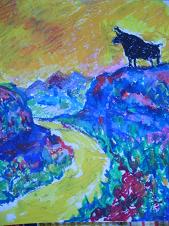
OLD BULLFIGHTER
Howling, wild howling deep inside,
Like a trapped and hungry wolf deprived of prey.
When in a long mirror with naked, pitiless eye
I survey the wreckage of what now is me,
And aghast! Remember how I used to be.
Blade slim, straight as a spruce fir,
Not willow bough bent, as here.
Unaware that the power and strength astir,
And surging like a torrent through my frame,
Daily weakens, and once departed will not come again.
My youth haunts me in a traje de luces
O brilliant suit of lights! Like gold made animate,
A bull taunts me, like dark and dreadful night;
Its ragged wounds spurting blood, bright
As poppies, spatter the horn driven into my side.
Brave and fearless bull, I seek pardon
For the death my sword in you did summon.
But all your being was sentient when you died,
Whereas the wreckage I have now become
Drifts, drifts aimlessly on a sluggish tide.
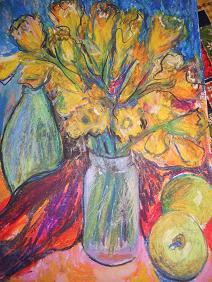
ANGHARAD
Fitful the sun, biting the wind
Against the miner’s pitted skin,
As he climbed the green hillside
To the chapel. Like teeth in senile gums,
Crooked and discoloured, all the tombstones,
Except for one, pristine, not yet scarred by time and weather,
Heading the grave of his young daughter.
Fleetingly lit by sun, fretted by wind
The daffodils, planted in her memory
At which he stared with raw intensity,
Willing, willing them to part, and she bestir,
Rise, and run toward him, as of old,
To jump into his arms, unheeding what she wore
Would be blackened by his sooty pit-gear.
Clouded the sun, the wind piercing chill
On his pitted hands and cheeks, wet suddenly
By a Welsh downpour, drenching, spattering
With myriad tears, each drooping daffodil.
He turned aside, went back down the green hillside,
Drained, bereft of hope, of dreams long-harboured,
Buried, all deep buried now – with Angharad.
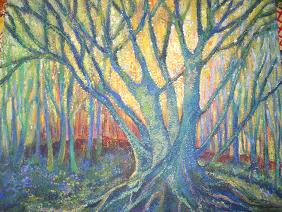
WOMAN GUNNER
Again we hear what has by now become familiar
The hum of German bombers, Heinkel and Dornier,
And their escort fighter-planes.
On a gun-site in Kent we are waiting
Waiting for them to appear.
Battle-dressed gunners on the monstrous guns,
Battle-dressed young women feeding into instruments
Vital information, including range and height
Of the attackers, to intercept their flight.
Starless in the sky, but soon emblazoned
With lethal, fiery stars of bursting shell
As gunners, at the firing officer’s command,
Swiftly release their deadly load.
The detonation shatters the ears,
Like being scalped while still alive.
Cordite stings the whitened nostrils
And to smarting eyes brings tearIn the eye-piece of the predictor,
With blurring vision, I see tongues of flame
Shooting from a crippled escort fighter-plane.
It plummets wildly, but rising compassion
Is checked by a lightning recall of the Blitz.
Our house, our home, falling all about us!
The hideous grating noise, choking dust, icy numbness.
Being dug out, everything gone that was here but yesterday,
And momentarily reliving it to myself I say,
Sorry Hans, Wilhelm or Franz – but touché.
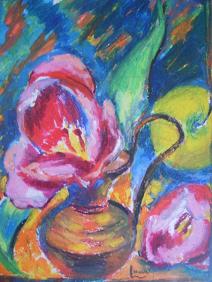
PHANTOM SPITFIRE PILOT
This is a most lively day in spring
To be on a coach trip to Kent.
All the apple and cherry blossom will be out
In tumultuous tides of pink and white.
The youngest person in the coach
And the most important, is the driver.
All the passengers are old age pensioners.
A few have dozed off; others are livelier.
I am one of those, or would be
If memory had not stirred deep buried pain,
Taking me back over half a century
To when happily traversing a winding Kentish lane.
But then it was September and soporific the air
With the lulling scent of hops, and roses wild
Draped all a-tangle with old man’s beard
Over bedraggled hedgerows brushed by butterflies.
Oh now I see you quite clearly phantom
Spitfire pilot with eyes of speedwell blue
Cycling along this lonely, tree-shadowed lane
With me balanced on the cross bar in khaki.
Soon you will disappear lean, good-looking phantom
With tender eyes of speedwell blue.
But never from my heart which lasting homage pays
To you, and all the young, selfless and valiant few.
from NOT YOUR LAST MEMORY
When I die and shrouded
Suitably in coffin lie,
Do not come to gaze at me.
Your last memory must not be
Of what is now an effigy.
SIGNPOSTS
If there be signposts
In eternity,
At the first one
Wait for me.
Soon or late
I will come
Unwaveringly, joyously,
Hurrying to catch up
With my love
Who went ahead of me.
HEAVENLY SHORE
When the soul has bid
The time-bruised flesh goodbye
Upward it will soar
And fly like bird migrating
To a distant, heavenly shore.
There to unite with those
Of all the deeply loved
Who have gone before
Joyously to dwell with them
Forever more.
Made at the tip of Africa. ©